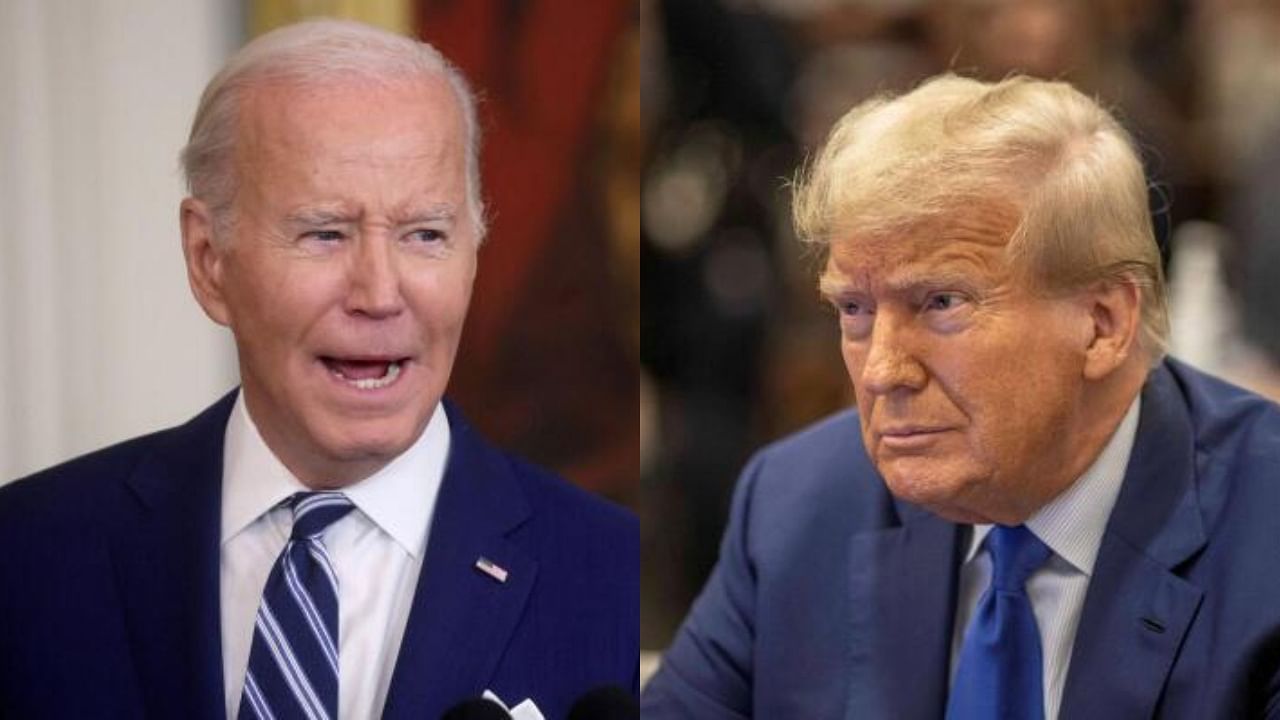
US President Joe Biden (left) and former President Donald Trump (right).
Credit: Reuters File Photos
Washington, DC: The U.S. government is preparing for its adversaries to intensify efforts to influence American voters next year. Russia has huge stakes in the presidential election. China seems poised to back a more aggressive campaign. Other countries, like Iran, might again try to sow division in the United States.
As Washington looks ahead to the 2024 vote, U.S. intelligence agencies last week released a report on the 2022 midterm elections -- a document that gives us some hints about what might be to come.
Spy agencies concluded Russia favored Trump in 2016. What about in 2024?
Russia appears to be paying close attention to the election, as its war in Ukraine is soon to enter a third year.
Former President Donald Trump, the leading Republican candidate, has expressed skepticism about Ukraine funding. President Joe Biden has argued that assisting Ukraine is in America's interest.
While bipartisan support for Ukraine remains, Russia is focused on weakening Democrats to prevent the United States from providing more aid in the years to come.
In 2022, the intelligence report found, Russia attempted to denigrate Democrats, including by amplifying allegations of corruption by Biden's family, in large measure because of his administration's support for Ukraine.
"Moscow blames the U.S. president for forging a unified Western alliance and for Kyiv's continued pro-Western trajectory," the report found.
Russia was distracted by its war in 2022, officials said, but the report explains how the fighting was intertwined with its efforts to influence American politics. Russia, according to the report, considered delaying its withdrawal from the southern region of Kherson to avoid giving Ukraine supporters in the United States "a perceived win before the election."
Russia ultimately announced its retreat a day after the election.
With Republican opposition to Ukraine funding growing, officials believe that Moscow is likely to try to interfere even more in 2024.
Has China learned from Russia?
While Russia has long tried to influence American political debates over divisive issues, China has traditionally focused more narrowly, working against local politicians who take stands on Tibet, Taiwan or other similar issues. U.S. officials say that may be about to change.
It is not entirely clear what China is going to do, or what side it will take in 2024. But the report suggests that Chinese leaders viewed the 2022 election as a chance to portray the U.S. model as chaotic.
With President Xi Jinping tightening his grip on politics and the economy, the ideological differences between the United States and China have grown starker. With that, Chinese leaders are more interested in influence campaigns that magnify social divisions in the United States, long the focus of Russian operations.
How far the Chinese will go is not completely understood. But American spy agencies appear to know more than they are revealing. The report contains one of those frustrating redactions. It announces that Chinese leaders have "directed a new focus on" and then blacks out the subject of the sentence.
How might artificial intelligence play a role?
China has already begun experimenting with artificial intelligence in its influence campaigns. Industry experts say that new technologies will make it easier for foreign countries to mimic native English speakers and generate messages amplifying existing divisions more rapidly.
But government officials are more worried AI technologies could be used to create hyperrealistic -- but fake -- videos, the kind of disinformation that could do damage quickly.
Are countries still trying to hack into local government computer systems?
They are not. This is one bit of good news in the most recent intelligence assessment.
The American election system's extreme decentralization is its greatest defense. Russian hackers did target voting systems in 2016. But foreign countries now believe it is far too difficult to meaningfully affect vote counts by hacking into local government computer networks.
As a result, a variety of foreign powers have redoubled efforts to otherwise influence the election.
Beyond China and Russia
Besides China and Russia, the report looks at other countries interested in influencing the U.S. vote.
Cuba, hoping the United States will drop sanctions against its government, tried to weigh in on some congressional and governors' races in 2022, the report found. While details are redacted, the report said officials in Havana focused on Florida politicians because the Cuban American community in Miami has an outsized influence on policy toward Cuba. Iran backed several inauthentic campaigns on Twitter and other social media platforms seeking to boost progressive candidates. Some of those fake accounts also amplified pro-Palestinian sentiment.